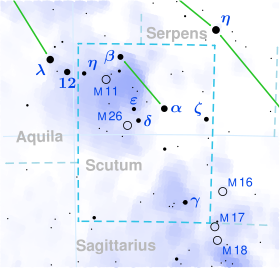Epsilon Scuti
| Observation data Epoch J2000 Equinox J2000 | |
|---|---|
| Constellation | Scutum |
| Right ascension | 18h 43m 31.251s[1] |
| Declination | −8° 16′ 30.77″[1] |
| Apparent magnitude (V) | 4.88[2] |
| Characteristics | |
| Spectral type | G8IIb[3] |
| U−B color index | +0.88[4] |
| B−V color index | +1.12[5] |
| Astrometry | |
| Radial velocity (Rv) | −9.8±0.6[6] km/s |
| Proper motion (μ) | RA: +21.781[1] mas/yr Dec.: +4,591[1] mas/yr |
| Parallax (π) | 5.7100 ± 0.1842 mas[1] |
| Distance | 570 ± 20 ly (175 ± 6 pc) |
| Absolute magnitude (MV) | -1.18[2] |
| Details | |
| Luminosity | 403[2] L☉ |
| Surface gravity (log g) | 1.00[7] cgs |
| Temperature | 4,500[7] K |
| Metallicity [Fe/H] | +0.05[2] dex |
| Rotational velocity (v sin i) | 5.1[8] km/s |
| Other designations | |
| Database references | |
| SIMBAD | data |
Epsilon Scuti, Latinized from ε Scuti, is a probable astrometric binary [9] star system in the constellation Scutum. It is faintly visible to the naked eye with an apparent visual magnitude of +4.88.[2] Based upon an annual parallax shift of 5.71 mas as seen from Earth,> it is located approximately 570 light years from the Sun. It is moving closer to the Sun with a radial velocity of −9.8 km/s.[6] Epsilon Scuti was a latter designation of 3 Aquilae.[10]
The visible component is a yellow-hued bright giant with a G-type bright giant[3] It is radiating 403[2] times the Sun's luminosity from its photosphere at an effective temperature of 4,500 K.[7] Epsilon Scuti has at least three faint visual companions, two 14th magnitude stars, B and D, separated from the primary by 13.6 and 15.4 arcseconds respectively, and the 13th magnitude C, which is 38 arcseconds away.[11]
References
- ^ a b c d e Vallenari, A.; et al. (Gaia collaboration) (2023). "Gaia Data Release 3. Summary of the content and survey properties". Astronomy and Astrophysics. 674: A1. arXiv:2208.00211. Bibcode:2023A&A...674A...1G. doi:10.1051/0004-6361/202243940. S2CID 244398875. Gaia DR3 record for this source at VizieR.
- ^ a b c d e f Anderson, E.; Francis, Ch. (2012). "XHIP: An extended hipparcos compilation". Astronomy Letters. 38 (5): 331. arXiv:1108.4971. Bibcode:2012AstL...38..331A. doi:10.1134/S1063773712050015. S2CID 119257644. Vizier catalog entry
- ^ a b Keenan, Philip C.; McNeil, Raymond C. (1989). "The Perkins catalog of revised MK types for the cooler stars". The Astrophysical Journal Supplement Series. 71: 245. Bibcode:1989ApJS...71..245K. doi:10.1086/191373.
- ^ Mermilliod, J. C. (2006). "VizieR Online Data Catalog: Homogeneous Means in the UBV System (Mermilliod 1991)". VizieR On-line Data Catalog: II/168. Originally Published in: Institut d'Astronomie. 2168. Bibcode:2006yCat.2168....0M.Vizier catalog entry
- ^ Mallama, A. (2014). "Sloan Magnitudes for the Brightest Stars". The Journal of the American Association of Variable Star Observers. 42 (2): 443. Bibcode:2014JAVSO..42..443M.Vizier catalog entry
- ^ a b Gontcharov, G. A. (2006). "Pulkovo Compilation of Radial Velocities for 35 495 Hipparcos stars in a common system". Astronomy Letters. 32 (11): 759–771. arXiv:1606.08053. Bibcode:2006AstL...32..759G. doi:10.1134/S1063773706110065. S2CID 119231169.
- ^ a b c Soubiran, Caroline; Le Campion, Jean-François; Brouillet, Nathalie; Chemin, Laurent (2016). "The PASTEL catalogue: 2016 version". Astronomy & Astrophysics. 591: A118. arXiv:1605.07384. Bibcode:2016A&A...591A.118S. doi:10.1051/0004-6361/201628497. S2CID 119258214.
- ^ De Medeiros, J. R.; Mayor, M. (1999). "A catalog of rotational and radial velocities for evolved stars". Astronomy and Astrophysics Supplement Series. 139 (3): 433. arXiv:astro-ph/0608248. Bibcode:1999A&AS..139..433D. doi:10.1051/aas:1999401. Vizier catalog entry
- ^ Eggleton, P. P.; Tokovinin, A. A. (September 2008), "A catalogue of multiplicity among bright stellar systems", Monthly Notices of the Royal Astronomical Society, 389 (2): 869–879, arXiv:0806.2878, Bibcode:2008MNRAS.389..869E, doi:10.1111/j.1365-2966.2008.13596.x, S2CID 14878976.
- ^ Wagman, M. (August 1987). "Flamsteed's Missing Stars". Journal for the History of Astronomy. 18 (3): 212. Bibcode:1987JHA....18..209W. doi:10.1177/002182868701800305. S2CID 118445625.
- ^ Mason, Brian D.; Wycoff, Gary L.; Hartkopf, William I.; Douglass, Geoffrey G.; Worley, Charles E. (2001). "The 2001 US Naval Observatory Double Star CD-ROM. I. The Washington Double Star Catalog". The Astronomical Journal. 122 (6): 3466. Bibcode:2001AJ....122.3466M. doi:10.1086/323920. Vizier catalog entry

